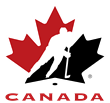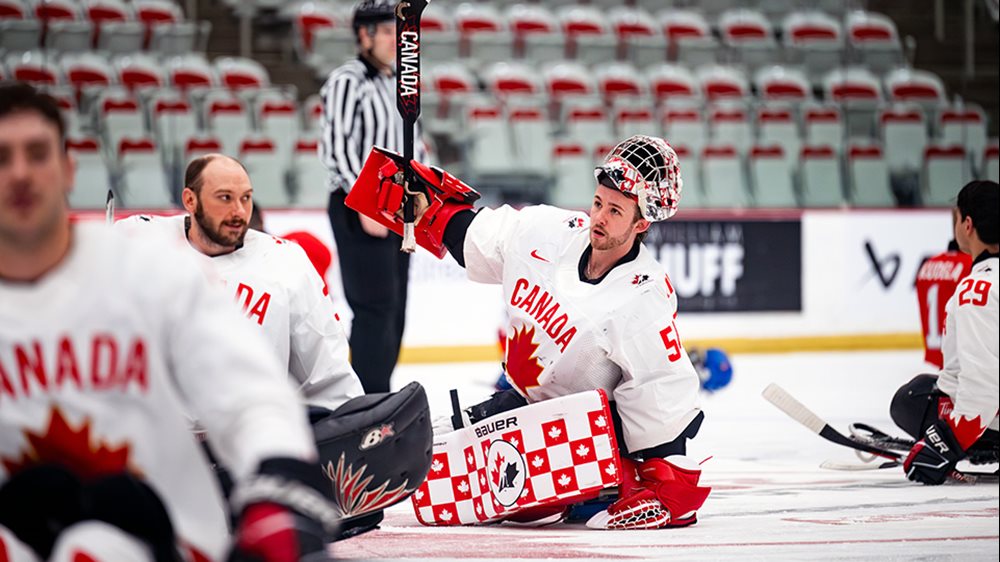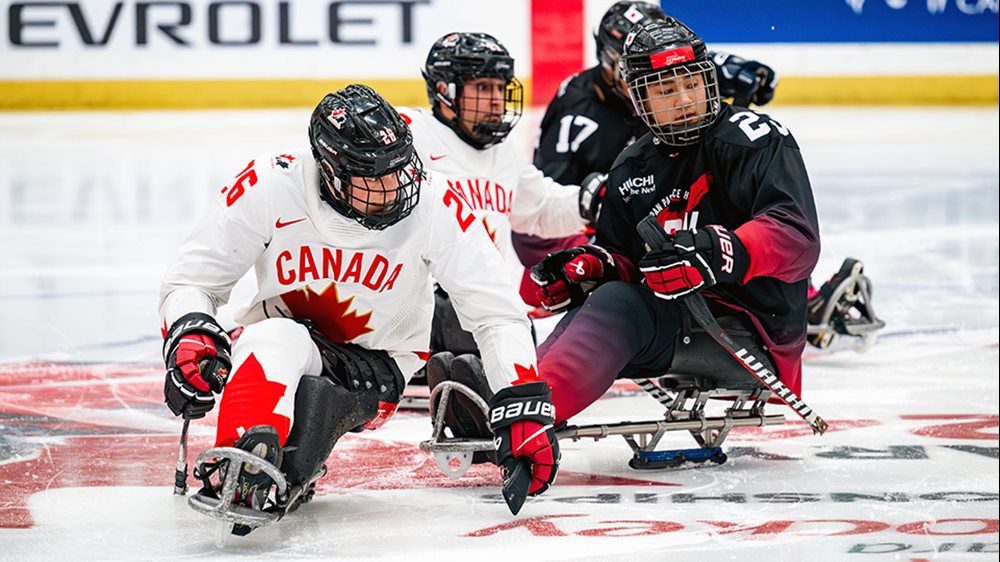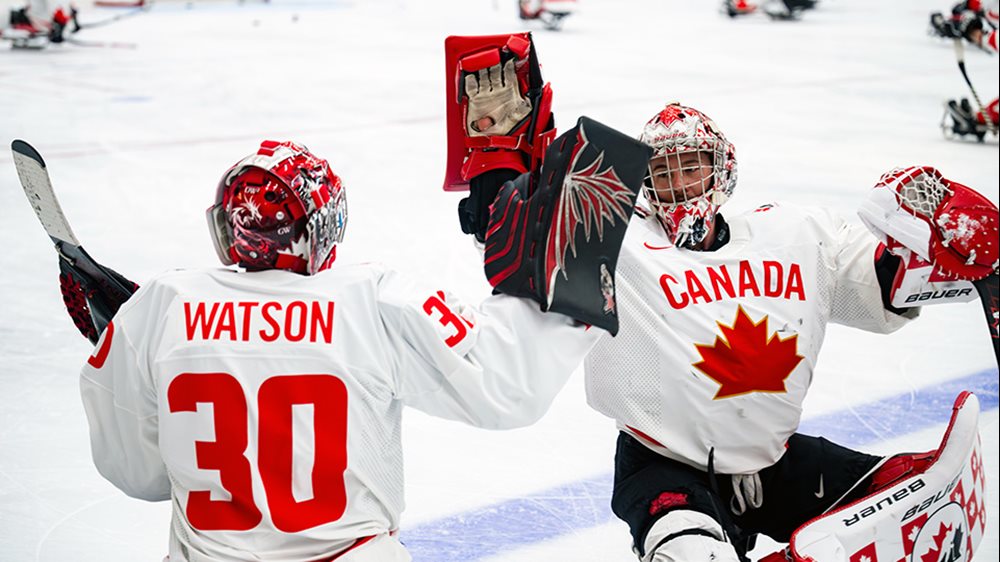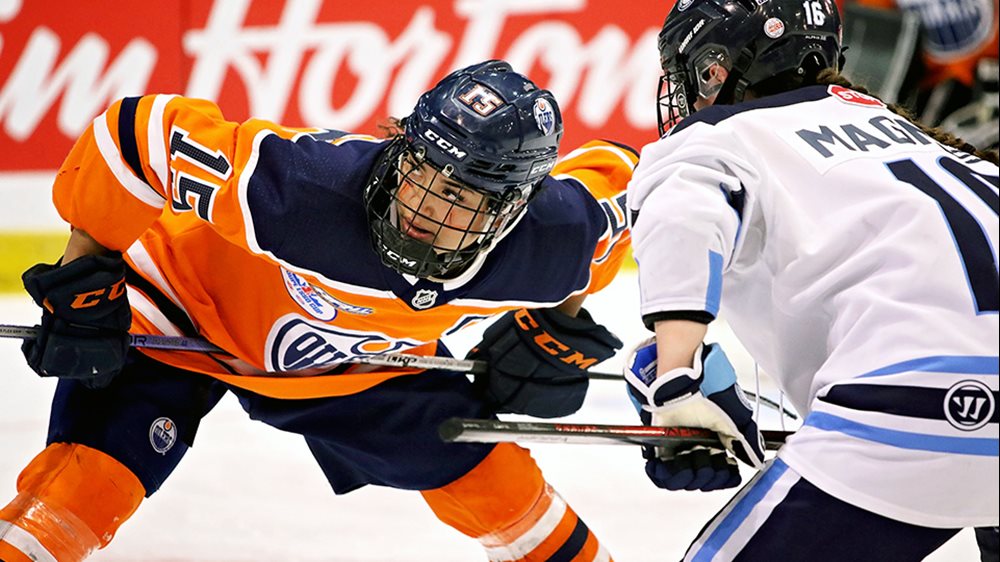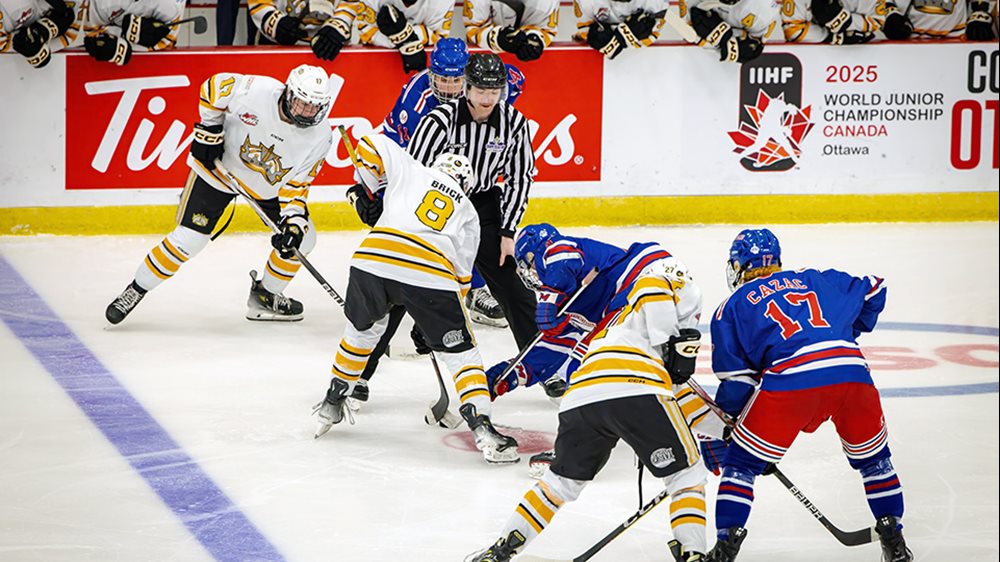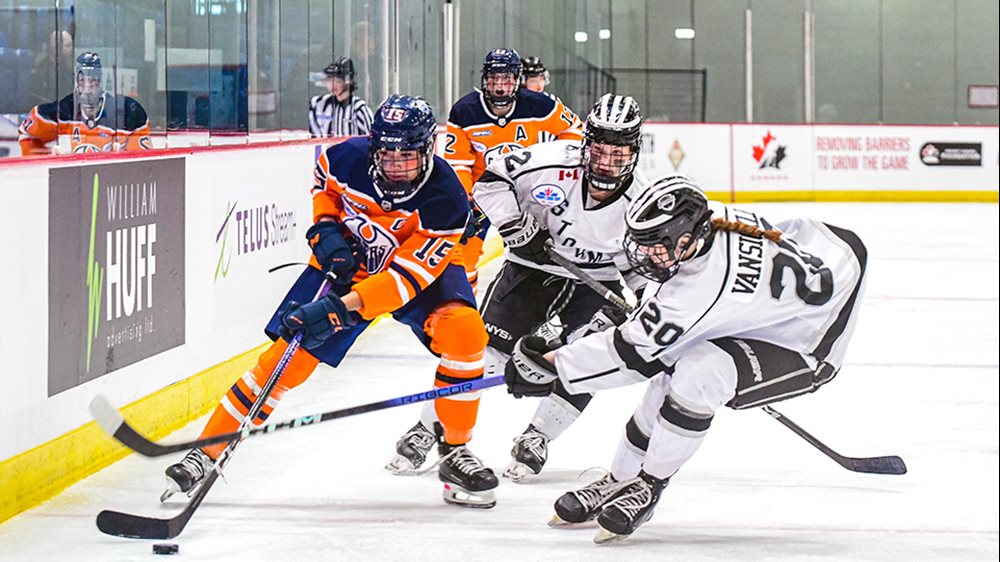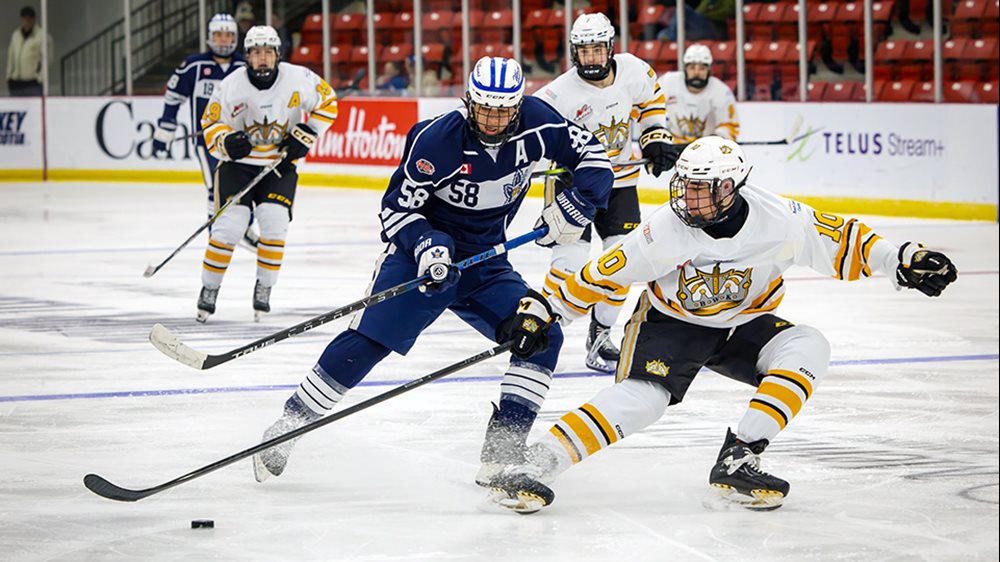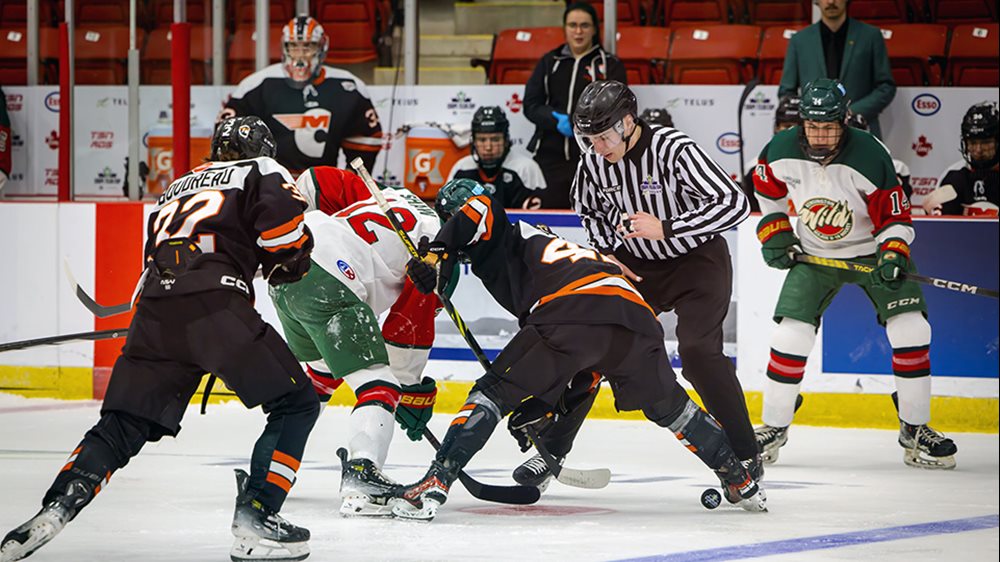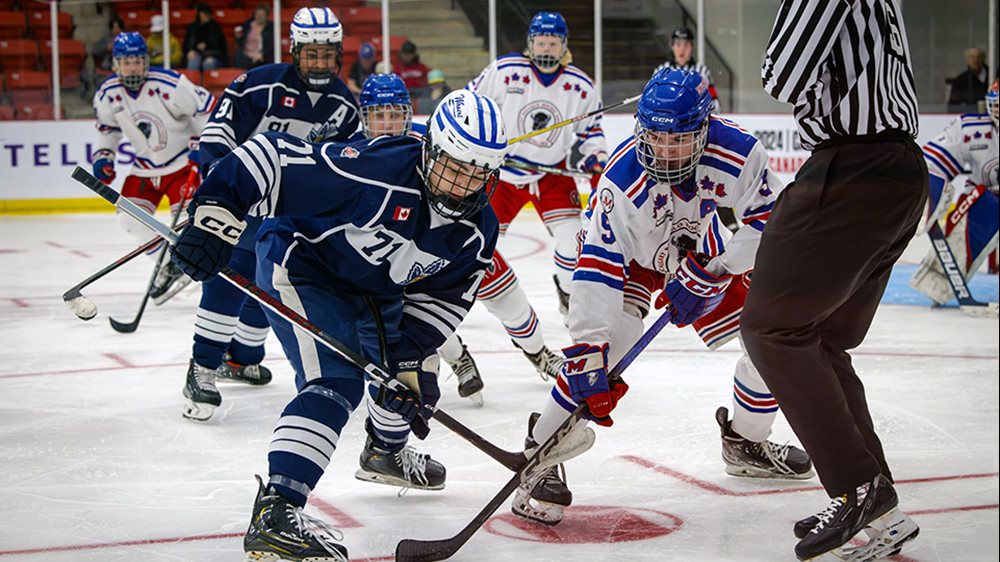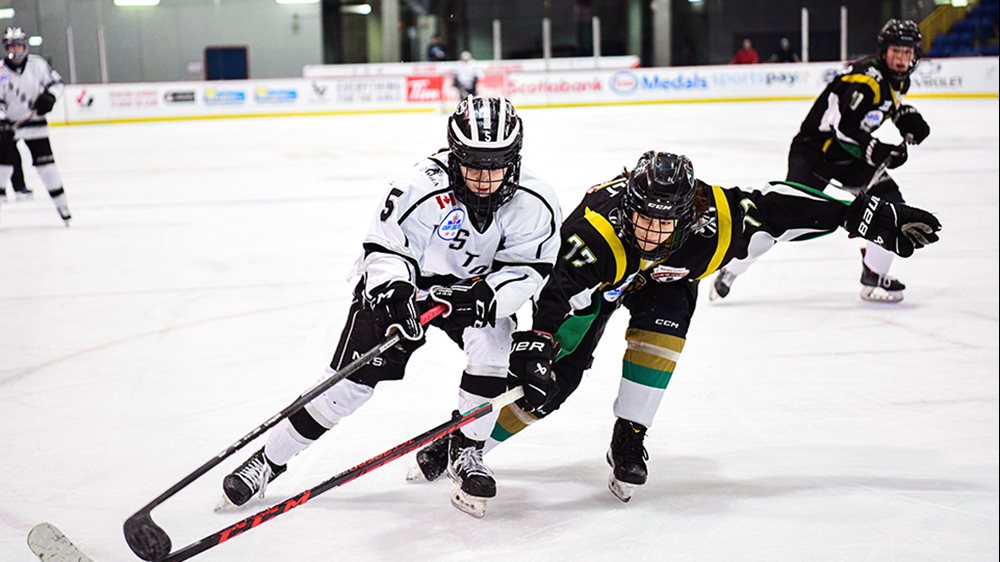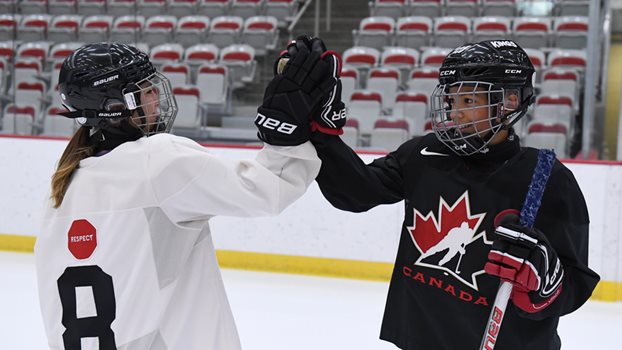
Enhancing academics with HCSA
From engaging students throughout the school day to growing the game in their community, Hockey Canada Skills Academies contribute to a unique experience for students
Creating an opportunity where students can learn new skills, build confidence and create lasting relationships is what educators like Shaune Beatty and Brett Cameron strive for in and out of the classroom.
Having the Hockey Canada Skills Academy (HCSA) available at their schools has been impactful for their students.
“The HCSA brings a lot of different opportunities for the students,” says Beatty, superintendent of school operations and supervisor of the HCSA for the Good Spirit School Division in Yorkton, Saskatchewan.
Good Spirit brought the skills academy to its schools to encourage a new culture, bring in new students and grow the game in its communities. The HCSA has been in Yorkton for four years now.
“Some of our academies have seven kids, including a few who have never played the game before,” Beatty says. “Some classes have even done equipment drives to help make the game more accessible and promote the growth of the game.”
Over 120 students across seven schools in Yorkton participate in the HCSA. For many, it allows students to engage with academics in a way that interests them.
“The feedback I’ve received is around the whole idea of engagement—the kids look forward to going to school and it breaks up the day,” Beatty says. “It’s about engagement at a different level outside of the classroom that the kids tell me they enjoy the most.”
The objective of the HCSA program is to enhance academic achievement through a balance of academics and athletics, while also improving their hockey skills.
“We’ve had two boys go through the HCSA program in our community and they have gone on to larger academies. It is great to see those that are motivated get those greater opportunities,” said Beatty.
As a former hockey player himself, Cameron tries his best to relay as much of the information he gained while playing to his students at Miramichi Valley High School in Miramichi, New Brunswick.
“I am just trying to pass along my knowledge of the game through our program,” Cameron says.
The HCSA at Miramichi Valley began in the fall of 2020 and has grown quickly. Originally, it was offered in one semester for Grades 9 and 10 and in the French Immersion program. In 2021, it was offered in French and English in both semesters. Now, there are 24 co-ed students per semester that participate in the program with different levels of ability.
“The smiles don’t leave their faces the entire time they are on the ice,” Cameron says. “Everyone has gotten better at their own pace … they are able to refine their skills and enjoy the game.”
Not only is the HCSA at Miramichi Valley teaching students fundamental hockey skills, but they also get an opportunity to get their officiating and coaching certifications, too.
“There is a true benefit to how it extends well past just hockey,” Cameron says. “It is so good to see the kids improve and work on and off the ice on their skills. The kids don’t always see it [improvement] in the classroom, but you can see the changes they are making and how they are becoming stronger and better week to week.”
The benefit isn’t just about the kids either. Cameron coaches AAA hockey in the community, and being the head instructor, along with a history and physical education teacher, he has noticed how being an HCSA operator has helped him as well.
“It makes me a better coach. All this time and effort put into the program has helped me when I coach my own team,” he says. “I am very grateful for the opportunity to teach these kids the game of hockey and all the fundamentals that come with it, but it is also about the other pieces that they get through the program as well.”
There are many special moments for the students through the HCSA, but one stands out for Cameron. Last fall, the Maritimes hosted the World Junior A Hockey Challenge in Truro, Nova Scotia, and a former HCSA player, Max Jardine, played in the tournament. All the current HCSA students went to the game to watch Jardine play at a high level.
“It showed them what they could achieve if they wanted to,” Cameron says. “It was great for our non-high-level kids to see someone at that level play.”
As the HCSA program continues to grow to over 150 schools in eight provinces, Cameron shares his advice for other operators: “The goal should be to meet the kids where they are, but not leave them there. Kids will get the most enjoyment and confidence from being taught properly and seeing improvement in their own skills over the course of the semester.”
For Beatty, the most value is when the academies build partnerships within the communities to reduce the hurdles smaller schools can face.
“Think beyond your higher skilled hockey players. Those will undoubtedly become more skilled through the additional ice time, but some of the best stories I’ve heard come from the less experienced and new players to the game,” he says. “A part of a successful HCSA is to grow the game by bringing in players that come with an interest in the game. These are students first and hockey players second, but get them in and make them players for life.”
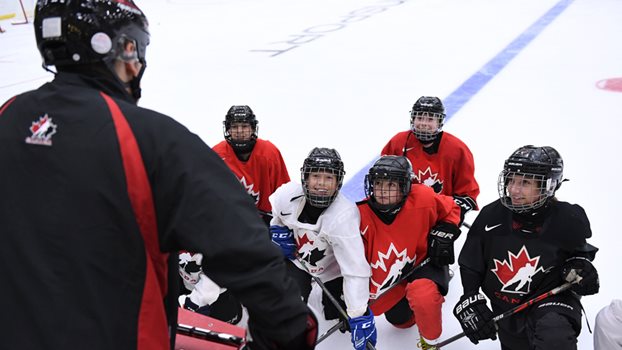
Returning to the rink
After a 2020-21 season full of uncertainty, the return to a sense of normalcy for local hockey associations and Hockey Canada Skills Academies is cause for excitement
There’s excitement buzzing around rinks from coast to coast to coast. Skates are freshly sharpened, sticks are newly taped and Canadians are celebrating the return of hockey.
After a season full of uncertainty last year, the return to a sense of normalcy is a welcomed sight for local hockey associations and Hockey Canada Skills Academies (HCSA).
“There’s tournament planning going on and exhibition games going on. Everybody’s just excited to get going,” says Trevor Hanley, a U18 AA coach from Martensville, Sask.
All the programs in Dave Tressor’s school board in Kenora, Ont., were not able to run last year due to the COVID-19 pandemic. With the return of our game, the program at Beaver Brae Secondary School is set to be reinstated in February.
“We’re so excited to have an opportunity to get the academy back and get the students going again,” says Tressor, who is the vice-principal at Beaver Brae.
In Athabasca, Alta., 2020 was supposed to be the inaugural year of its HCSA at Edwin Parr Composite School. The anticipation has grown over the extended start date, but the wait has paid off for the Grade 8 and Grade 9 students.
“Anytime somebody talks to me about hockey academy, I get the stupidest grin on my face because I’m just so excited,” says assistant principal Brenna Liddell. “I’m like a kid on Christmas Day, it’s so exciting. Our kids are having a great time and our parents are really adjusting well.
“I spent two weeks before November break meeting with each of our kids that are in it. We talk about academics, we talk about attendance and then I say, ‘Hey, tell me how hockey academy is going,’ and every single kid smiles and says it is the best thing in the world.”
For Porter Creek Secondary School in Whitehorse, Y.T., it was able to run its HCSA last year, but it focused mainly on skill development due to the restrictions from COVID-19 safety guidelines.
“I think [the students] are excited about the fact that they can do more gameplay [this season],” says Amy Vermeulen, the lead instructor at Porter Creek.
The program at Porter Creek runs in the second semester of the school year, but the buzz about the return of a more normal hockey program is already affecting the students.
“I see a few of them all the time in the halls,” Vermeulen says. “They talk about how excited they are to just get the semester over so they can start the hockey program.”
Local hockey associations across the country are also looking forward to getting back to a sense of normalcy. In Prince Edward Island, teams are back on the ice, but the main difference this season is the amount of time teams are allowed at the rink before practices or games.
Blaine Fitzpatrick, a Charlottetown Minor Hockey coach for the U15 AAA female team, knows the socialization before hitting the ice is beneficial for his team.
“They just wanted to get back to the way it was, be able to hang out, have some fun and chit-chat beforehand. We’re getting closer to that, we’re allowed in 30 minutes before now on a consistent basis, so that gives them that fun time at the rink,” Fitzpatrick says. “The excitement level is much higher because of the opportunity to potentially have a normal season as it was before COVID.”
One thing players in Yellowknife, N.W.T., are looking forward to is the return of tournaments.
“We generally get to play against the other smaller communities,” says U7 assistant coach Patricia Parker. “They come here, we go there and then we get to see a little bit of the town, they get to go to the swimming pools, and that’s the one thing they’re really missing right now.”
Hanley says everyone is back on the ice in his association, with U7 through to U11 teams practicing while U13, U15 and U18 teams have already started league play or are gearing up to begin. Last year, Saskatchewan teams were able to practice throughout the season, but they were limited to eight players on the ice at one time.
“It stretched a lot of guys to be creative and keep it innovative and exciting for the kids, so they’re excited to get back to full teams, working with everybody at once and certainly having the opportunity to coach in games,” Hanley says.
Creativity and adaption have certainly flourished over the past 18 months. With locker room restrictions in Yellowknife, Parker had to adapt to helping her young players get ready.
“They came fully dressed, but we had to tie their skates, untie them and bring them back to the parents,” she says. “We actually got to bond with them more because you got to talk to each kid as you were tying their skates and get to hear what they did on the weekend, or they would tell you what they had for dinner.”
Inspired by the NFL, Fitzpatrick created a playbook with all the team’s basic coverage systems last season so each player on his team can review it whenever they please.
“We don’t have as much time at the rink to go over lines with the group, so [each player] has that in a booklet at home,” he says. “They can spend their own time getting familiarized with that aspect of the game.”
Despite the uncertainties and challenges the pandemic brought, communities from coast to coast to coast are looking forward to using hockey to promote an active lifestyle.
“Mental health was a real concern, and I think this concern was not only throughout the province, but throughout the country,” Tressor says. “The hockey academy program provides a great avenue for students to exercise and get back and socialize again.”
Now that Our Game is Back, everyone is ready to get back to playing the game they love.
“It’s nice to see that they’re going to hopefully have a normal rest of their minor hockey careers and be able to enjoy their time at the rink with their friends,” Fitzpatrick says. “They’re going to work hard and develop, and you never know, maybe give themselves some opportunities down the road. I’m really excited for the kids.”

Creating a positive culture
The emphasis of inclusivity at Hockey Canada Skills Academies has helped to foster a positive culture for those who participate in our game from coast to coast to coast
At the beginning of each school year, Ryan Miller delivers the same speech to his Hockey Canada Skills Academy (HCSA) students at Osoyoos Elementary School in Osoyoos, B.C.
“We talk about what a privilege it is to be a part of an organization like Hockey Canada,” says Miller, who has helmed the hockey academy at Osoyoos Elementary for over a decade. “It is one of the top sports organizations in the world, and if you doubt that, go visit the [Hockey Canada] Hall of Champions in Calgary.
“I tell them that Hockey Canada creates a culture that values hard work and respect for every individual at the table.”
This past June, the national sports organization made a momentous step to forge a safer, more respectful and inclusive on-ice culture in Canada. Approval was granted for the adoption of Section 11 – Maltreatment in the Hockey Canada rulebook, which brings all forms of mistreatment under one umbrella. There are clear penalties for inappropriate behaviour from players and team officials.
There is also a new reporting system that will make it easier to report discriminatory incidents. Hockey Canada, like everyone, wants rinks free of discrimination based on race, ethnic origin, skin colour, religion, age, sexual orientation, gender identity and disability.
“Hockey Canada has made a firm commitment to making the game safe and inclusive for all who wish to participate, and the introduction of Section 11 provides our 13 Members, local hockey associations and officials across the country with clearly-defined criteria for enforcing rules related to many different forms of inappropriate conduct,” Hockey Canada CEO Tom Renney said when the rule was announced. “We believe this is a great step towards ensuring we limit the number of incidents that occur on and off the ice and will allow players of all ages to enjoy our game free from abuse, discrimination, racism and all forms of maltreatment.”
These changes delight Miller.
“We are seeing a change in what is accepted and not accepted. It’s nice you are seeing changes at the elite level and it is starting to trickle down to the grassroots. I still think we have a long way to go, but I do believe with so many things happening around the world with Truth and Reconciliation, and Black Lives Matter, that more awareness is out there and people are seeking to understand.”
Inclusiveness has always been a bedrock principle of HCSA institutions from coast to coast to coast, and it is an important aspect for fostering a positive culture for participants.
David Ruggiero, the long-time HCSA coordinator for Central Okanagan Public Schools until 2019, has seen students from a variety of backgrounds come through the program.
“From the start, we had a lot of international students participate. This year we have one [Mexican player] who played roller hockey before, so he is learning ice hockey this year and is doing a good job.
“The way we start the year is a talk in the classroom about the privilege of being in this program and the privilege of travelling away from the school to participate in the program. While you are at the arena, you are still a member of School District 23, so the rules and principles that apply in the classroom apply here.”
One protocol installed in the Central Okanagan Public Schools system to deal with any form of bullying in the HCSA program is having the vice-principal of each school involved in the disciplinary process, if necessary. This ensures the school’s senior administration leaders are invested in ensuring the culture within school walls, and the culture at the arena remain in alignment.
Ultimately, inspiring students to invest in the notion of being standard-bearers of respect is key to inspiring HCSA programs devoid of maltreatment, says Miller.
“We talk about how we create a culture of safety and respect. Every day we don’t really get to choose what happens to us, but we get to choose our attitude and effort, and that dictates what we do with what happens to us.
“We want to create a thinking culture. They are the bosses of themselves, so they get to decide if they want to follow me or not. I talk about how I hope to have proven myself to be trustworthy, organized and hardworking, and that I am someone who they want to follow. We want to be thinking when we watch drills, and we want to think about how to support our teammates positively.”
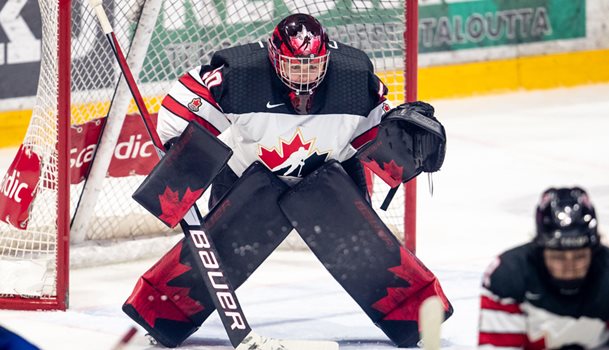
Q&A with Kristen Campbell
From attending a Hockey Canada Skills Academy to playing on Canada’s National Women’s Team, Kristen Campbell reflects on how Shaftesbury High helped her achieve her goals
When she was 16 years old, Kristen Campbell made the big move from her hometown of Brandon, Man., to attend Shaftesbury High School, a Hockey Canada Skills Academy (HCSA) in Winnipeg.
Eight years later, the goaltender is competing for a spot on Canada’s Women’s Olympic Team roster. Campbell took time out from her centralization schedule to talk about her HCSA experience and how she continues to be impacted by her time in the program.
Hockey Canada (HC): Why did you decide to attend an HCSA?
Kristen Campbell (KC): I moved away from home to do it because I knew I would get maximum development there. I was able to practice every single day on the ice with our team and hockey was counting as a credit there too, so it was awesome because my gym class was out on the ice. I had my goals set on playing [NCAA] Division 1 hockey in the [United States] and then also making Team Canada, so that was going to be a step in the right direction… I had some great coaches out there, who had a lot of experience with girls getting into post-secondary, Division 1 schools. So definitely a lot of factors as to why I made the move, but I knew it was going to be crucial in helping my game develop and then ultimately achieving those goals.
HC: How did your experience at a HCSA prepare you for playing in the NCAA and with Team Canada?
KC: There’s a lot of things I learned from it… I think the biggest thing was just time-management skills. We were travelling a lot, but practicing every day on the ice; it was quite a lot, but it just prepared me for college and that lifestyle. I think that being able to incorporate a heavy training schedule at a young age really helped me when I hit the college ranks and then obviously, helped me prepare for my opportunities when I got invited to Team Canada camp as well.
HC: What’s your favourite memory from attending an HCSA?
KC: I would say all the times I got to spend with my team. Not just at the rink, but away from it too… It was just so much fun. Obviously, I was going to school with all the girls and then you’re practicing with them. It’s just the ultimate hockey experience. Before, I wasn’t going to school with the people I played hockey with. So, I think just enjoying every moment, whether it was in a classroom when you’re doing schoolwork or in the locker room, road trips, just everything. It was really great to be able to always be with your team.
HC: Who was a coach or instructor that really made an impact in your life during your time at Shaftesbury?
KC: My goalie coach was Gord Woodhall. He coaches with the [National Women’s Under-18 Team] now. I hadn’t had a full-time goalie coach before, and he was able to come out to all of our practices and always had a plan for me, development-wise. We always had something I was working on that day. He was my psychology teacher too, and my math teacher. He was really great with the psychological side of the game. He really helped me mentally as a goaltender. We still keep in touch regularly… he definitely had a big impact and still continues to keep having a big impact on me.

Learning the game
Looking for a taste of Canadiana, an exchange student from Germany got on the ice with a Hockey Canada Skills Academy
An exchange student from Kierspe, Germany, Laura Toews wanted to experience a little bit more of Canada.
So she enrolled in the Hockey Canada Skills Academy program at Morden Collegiate Institute in Manitoba, getting onto the ice for the first time with the help of her teachers and family, who helped gather all the equipment she needed.
Laura’s positive attitude and eagerness to get better was what made teaching her so much fun. What were her favourite parts of the HCSA experience?
“I’ll never forget the first day finishing a drill, being last, and when I stopped the rest of the class clapped their sticks on the ice for me. My face was red, but I was proud of myself.”
“I won’t forget the first time I tricked the goalie and scored my first goal.” “Looking at my skills test results and seeing huge improvements from the beginning of the year.”
“Discovering that ‘helmet hair’ actually exists.
With a confidence she didn’t have at the start of the program, Laura is eager to get back home to Germany at the end of the school year and share her new-found love for Canada’s game with her family.
And what will her lasting memory of the HCSA be?
“I feel like this is suitable for everyone who wants to learn how to play hockey, but also wants to strengthen their character,” she says. “Someone who is wanting to challenge themselves and build up their patience and confidence. Someone who likes to have fun and likes to feel like you belong to a team. And if you come out learning a few hockey skills, then that is a bonus.”

Seeing where hockey happens
A trip to Alberta for HCSA students from Regina included a stop at Hockey Canada headquarters
The Grade 9 students and staff from the Hockey Canada Skills Academy at Martin Collegiate in Regina, Sask., travelled to Alberta from April 24-26 for their annual athletic/educational experience.
The co-ed program spent one of their days in Calgary and experienced a fun and challenging on-ice skills session at the WinSport Canada facility, led by Hockey Canada staff. The students were also given a tour of the Performance Training Centre at WinSport, including a presentation on the world-class facility by the professional and well-prepared staff at the PTC.
Students were also toured through the Hockey Canada facilities, experiencing what it feels like to sit in the same dressing room as national team athletes, along with stops in the Team Canada gym and Hall of Champions, looking over the history and successes of Canadian hockey.
The day ended with an educational tour of Canada’s Sports Hall of Fame, which houses so many national treasures.
The students and staff from Martin Collegiate would like to thank Hockey Canada and WinSport Canada for a wonderful experience!
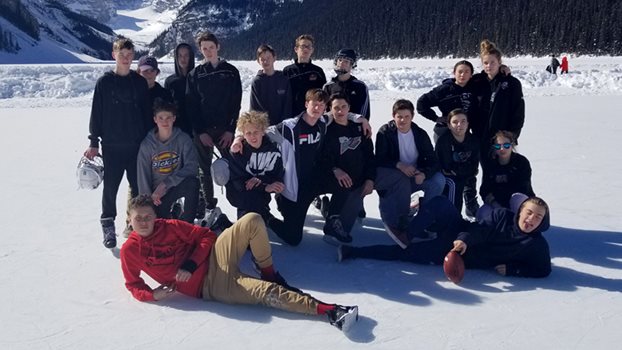
Hitting the road for hockey
Students from the HCSA at KLO Middle School in Kelowna headed to Alberta for a fun-filled experience on and off the ice
The moment everyone had waited for – days, weeks, even months – finally arrived.
At 6 a.m. on March 12, we departed from the Okanagan, with so many fun activities on the itinerary. The 10-hour bus ride was long, but there was always something to do; it gave us the opportunity to get to know our classmates better.
The highlight of the first day was definitely the stop for a skate on Lake Louise. What a beautiful spot! When we arrived at the hotel, everyone had tons of energy. We decided who was sleeping where and we were set.
On Tuesday we had an ice session at West Edmonton Mall, which was super cool. We also went to the World Waterpark at the mall (which was gigantic), had a team dinner at Boston Pizza, and capped off the day at the movie theatre.
Wednesday started at the University of Alberta to play some soccer and football, before we were treated to the San Jose Sharks’ morning skate. It was so cool to have the arena all to ourselves for that!
We then headed to Galaxyland for some more fun and bonding with the group. That night, we were back at Rogers Place for the Oilers-Sharks game, which was a thrilling 4-3 win for San Jose. Watching an NHL game live and with all your friends is quite the experience!
After the stay in Edmonton, I didn’t want to leave for Kelowna … but every good thing has to come to an end.
I have been part of the Hockey Canada Skills Academy for the past two years. It is so much better than a regular gym class, because everyone is athletic and willing to play any sport. On the ice, so many of us have greatly improved on our skills. Thanks to everyone with the HCSA who made the trip possible.
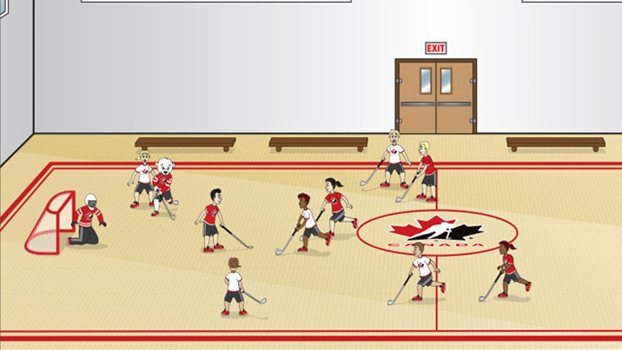
Hockey Canada, Floorball Canada and Floorball Pro partner to bring floorball into Canadian elementary schools
CALGARY, Alta. – Hockey Canada has partnered with Floorball Canada and Floorball Pro to introduce the game of floorball to students from Grades 3 to 6 as part of their physical education classes. The partnership will focus on using floorball as an inclusive gym-based introduction to hockey. The introduction of an elementary school program will allow Hockey Canada to reach a community of nearly 10,000 schools.
Floorball: An Introduction to Hockey is a 10-lesson curriculum that includes lesson plans focusing on floorball basics, such as stickhandling, passing, shooting and game play. Each lesson plan has three components: Getting Ready, FUNdamentals and Learn to Play.
“This is an exciting partnership for Hockey Canada as we continue to grow the game,” said Paul Carson, Hockey Canada’s vice-president of hockey development. “We want to get hockey into schools, make sure the game is part of the every-day curriculum of young Canadians, and this is a tremendous way to do that.”
For $499.99, participating schools can purchase an equipment package that includes everything they need to get started. The package includes:
- 12 Hockey Canada X3M Campus 36 sticks
- one Hockey Canada Salming Matrix 103cm stick
- 12 Salming Aero floorball balls
- Hockey Canada X3M Campus stick bag
- Hockey Canada floorball curriculum (available separately for $40)
- Floorball: A Sports Revolution DVD
CLICK HERE TO PURCHASE THE EQUIPMENT PACKAGE AND CURRICULUM
Schools also have the opportunity to register with Floorball Canada to access qualified instructors to assist teachers incorporating floorball into their physical education curriculum as an introduction to the sport of ice hockey.
Floorball is a fast and exciting game that promotes end-to-end plays with quick transitions and fluid game play. The rules stress the importance of safety and sportsmanship and are designed to limit the chance of injury without decreasing the speed or skill of the game. Floorball sticks are lightweight, inexpensive, durable and non-marking on gym floors. The sport of floorball does not require athletes to wear any protective equipment; only a T-shirt, shorts and athletic shoes are required.
For more information, please visit www.hockeycanada.ca/floorball and www.floorballcanada.org.
Selecting a Summer Hockey School
Selecting a summer hockey school can be a difficult decision to make. There are numerous hockey schools in each community each offering unique features and experiences; but how do you select the appropriate camp to meet your players’ needs? There are numerous variables to consider when selecting a summer hockey school for your player.
An important variable to consider when selecting a summer hockey school is whether to select a residential hockey school or a daytime hockey school. Both options offer your player a spectrum of benefits, therefore it is up to the parent and player to determine which options works best for them. Residential hockey schools offer the player the experience of participating in a hockey program in a new environment, away from home, where the player is exposed to new friends, experiences, and opportunities. A daytime hockey school offers the same experiences, but allows the player to continue to fulfill their responsibilities and commitments at home. If your player enjoys traveling, or wishes to attend college/university away from home, residential hockey schools may be an exciting opportunity for them to experience.
It is important when selecting a hockey school to select a school that places a strong emphasis on the development of the fundamental technical skills of the game. Skating, puck control, and shooting should make up the majority of on-ice sessions. It is the development of the fundamental technical skills that is going to help your child develop into the most successful player he/she can be. It is also important to consider hockey schools that offer a dry-land, off-ice, or class-room component to their program. Much can be learned and great improvements can be made away from the ice surface. These components help develop life skills which will help your player succeed not only in hockey, but in many other situations they may encounter.
Another important consideration when selecting a summer hockey school is the quality, and quantity of instructors. Ensure the instructors employed are certified through Hockey Canada’s National Coach Certification Program (NCCP), and have a strong background coaching hockey at the development level or high performance level. Do not be enticed by schools that advertise NHL “guest coaches”. “Guest coaches” are not involved in the daily on ice activities, and may not be scheduled to appear while your player is attending the school. Also, ensure that there is a good player to instructor ratio on and off the ice. A strong on-ice instructor to player ratio is 1 instructor to every 6-8 players. This will maximize the time and opportunity your player has to learn from the qualified and knowledgeable instructors.
Before registering for a summer hockey school, do your homework on the school you wish your player to attend. Communicate with players and parents of players who have attend the school in previous years. This is a great way to ensure the quality of the school. Also, contact the school directly and verify the information you have received from their brochure and other sources. Make sure to ask any additional questions you have regarding their program.
Finally, make sure that the summer hockey school experience is FUN for you player. Fun is the ultimate goal of hockey, and should be for the summer hockey school experience.
Please find below a checklist for selecting a summer hockey school
HOCKEY SCHOOL CHECKLIST FOR CHECKING OUT SCHOOLS
Ads and promotional literature?
Direct inquiries?
Previous attendees?
Fees?
Safety?
The head instructor?
The staff of instructors?
Staff screening process?
Hours per day of on ice instruction?
Skills, tactics and team play taught?
Scrimmage time and games?
Classroom instruction?
Dryland training?
Videotape?
Other instructional activities?
Grouping players of similar skills and needs?
On-ice pupil/instructor ratio?
Amount of individual instruction?
Report card?
Meal menus?
Sleeping accommodations?
Off-ice supervision?
Skate sharpening facilities? Pro shop?
Medical and first aid facilities?
SPECIAL CONSIDERATIONS FOR GOALTENDERS
How many goalies on the ice at one time?
Special goaltending instructor?
How much instruction time?
The goaltenders' curriculum?
What's the pupil/instructor ratio?
PREPARING TO ATTEND HOCKEY SCHOOL
arrive in good physical condition
check and pack all your equipment
extra socks and underwear
extra sticks
other sports equipment and clothing
health insurance ID
know what skills you want to improve
Come ready to have fun!
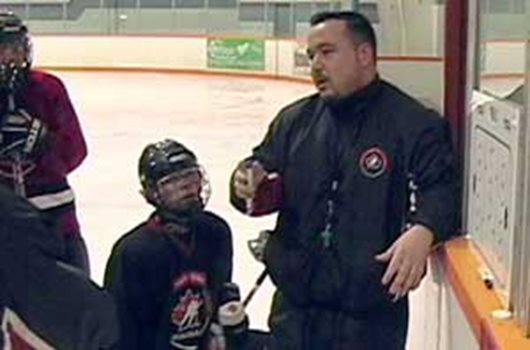
Sherwood Skills Academy
Anthony Herrington thought it would be a great idea to teach hockey during regular school hours.
After completing his Masters of Education thesis at the University of Victoria, Herrington worked hard to bring his hockey coaching skills to his job as a physical education teacher at Sherwood Secondary School in Hamilton, Ont.
Based on his experience working with a similar school-based hockey program in Victoria while attending university, Herrington started teaching hockey skills to Grade 9 students in the fall of 1999.
Since that time, the program has grown to the point where 78 students in Grades 9 to 11 signed up to take the class this year and it has also become an official Hockey Canada Skills Academy.
“Personally, it has been a great experience to be involved in a ground-breaking program for hockey players regardless of their ability,” Herrington said. “Ice hockey is a sport that has not traditionally been taught in the P.E. curriculum and it has given me a chance to use my expertise during the school day.”
According to Paul Carson, Hockey Canada’s Director of Development, the Hockey Canada Skills Academy program is “one of the most dynamic new initiatives” introduced by Hockey Canada.
The 10th recommendation of the 1999 Molson Open Ice Summit led to the development of the HCSA program, explained Carson. The recommendation is an initiative to “promote cooperative efforts between school boards, local hockey associations and sponsors, to better utilize ice times and school facilities and move towards the development of school sports.”
By becoming a licensed Hockey Canada Skills Academy, Herrington said his program was enhanced through the use of drills, videos, and off-ice exercises, supplied by Hockey Canada. “And, of course, the Team Canada jerseys,” Herrington added.
In its second year as an official HCSA, the Hamilton – based program has drawn rave reviews from school administrators, teachers, students and parents.
“It’s a very, very positive program,” said Sherwood vice principal Doug Cihocki. “It’s a big addition to our school."
Ron Teufel, Sherwood’s PE department head and an on-ice instructor of the Grade 9 class, commended the local school board for being innovative and throwing their support behind the program.
“I thought it was a long shot, but I also thought it was a great idea,” said Teufel, recalling his impressions of the idea when he first heard about it. “It was something very new to the area – something new to Ontario.”
Rob Kitamura, an experienced NCCP Advanced II Level coach and the Scouting Coordinator for the OHL Barrie Colts, was hired as an on-ice coordinator for the program.
“He’s a great guy and an excellent hockey person,” said Herrington, who is also an Advanced II Level coach. “We’re really fortunate to have him. He’s really enhanced our program.”
“Personally I think it’s an excellent idea,” Kitamura said. “They should have them in most middle schools and secondary schools. It’s a perfect supplement to a regular hockey program.”
Currently in Grade 12 at Sherwood Secondary, Jordan Ward, 17, went through the program from Grade 9 to 12.
“It was awesome,” Ward said. “I liked it a lot. I just liked how we got to go to the rink to play during gym class.” Ward appreciated the extra hockey skills he learned during the daytime sessions.
“You could tell it made students better hockey players over the year,” he said, noting the instructors are first rate. “They were really good with us. They made sure we had a good time.”
Grade 10 student Brandon Key has enjoyed the lessons he has learned so far while taking the class.
“No matter how good you are, there’s always ways to improve yourself and get better,” said the 15-year-old, who enjoyed getting extra ice time and enhancing his knowledge of the game. “It’s a great way to meet new people and learn lots of things about hockey.”
Key can look forward to taking the program again next year, but he’s lobbying the instructors to offer the class in his senior year as well.
“We’re trying to get the teachers to put it in Grade 12 too,” Key said. While Ward is a AAA level player with the Hamilton Jr. Bulldogs and Key competes at the Minor Midget A level with the Chedoke Express, Herrington said the skills academy isn’t an elite program.
“It is co-ed and open to any student wishing to improve their skills,” Herrington said, noting the 70 per cent of the students who sign up are recreational house league players.
Regardless of their ability and level, students in the class get the opportunity to improve their skills, Kitamura said.
“It presents the community coach the opportunity to use his or her expertise to improve the skill level of each player,” he said. “It gives us the time to work on all the important things we as coaches tend to overlook in a competitive program or club situation.”
Making the program available to all levels of players was one of the school board’s main goals when it backed the initiative.
“There was concern from other schools that it would be an elite program,” Cihocki said. “It’s certainly not that. We’re not out raiding other schools for hockey talent.”
The on-ice sessions are based around skill development and not around team concepts.
“They do a lot of on-ice drills that sometimes don’t even involve sticks and pucks,” Cihocki said.
“We’re not game orientated,” Teufel added. “We’re all about skill development and having fun.”
For the instructors, seeing students have fun while learning skills is what the program is all about.
“The experience has been priceless,” Kitamura commented. “As the semester progresses you can see the players gain confidence and try the new skills they have learned.”
Teufel and Herrington agreed that seeing the positive reaction of the students is rewarding.
“Seeing the kids enjoy it, that’s probably one of the biggest rewards,” Teufel said.
“It’s rewarding for me because it does put fun into hockey,” Herrington said. “It’s great to see smiles on their faces. That they are not scared to try new things is really rewarding as a teacher.”
Herrington explained that the students have to give up some of their free time to take the class. “We have to take a bus to the arena as the closest arena is about a 10 minute drive, so we use the lunch hour to get extra time for the class,” he said, noting that students usually eat their lunches on the way to the arena.
Once changed and on the ice, students receive almost an hour of instruction before heading back to school for their remaining classes.
During the introductory lesson each semester, Herrington encourages the students to enjoy their time on the ice and use it to enhance their skills.
“I bring them in and I say, ‘Look around everyone, there is no better place to be than in an arena during the school day. Nobody else is here. It is just you and the ice – let’s use it to have fun and to improve your skills’."
The sessions always include some sort of fun game, often incorporating the use of a tennis ball or ringette ring instead of a puck. Other times, students play a game of 3-on-3 with revised rules near the end of the class. “We’re doing some really cool things here,” Herrington said.
The Sherwood program has even attracted the interest of other schools. In March, a group of teachers, parents and students from Peterborough visited Hamilton to take in one of the Sherwood skills academy sessions.
“They had a couple students who actually participated in the on-ice sessions,” Teufel said.
“They were really impressed,” Herrington beamed.
For more information: |
- <
- >
